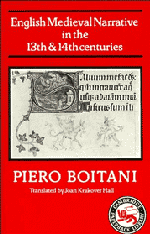2 - The Comic Tradition
Published online by Cambridge University Press: 04 April 2011
Summary
At this point we leave the sphere of literature sanctioned by the authorities, and enter that of unofficial culture, which, as we have seen, was condemned as mad and dangerous in Handlyng Synne. Because of the oral character of its material, and because of the Church's domination over official culture, manuscripts were not widely produced and circulated until the second half of the fourteenth century. Hence very little of this literature has come down to us from the thirteenth and fourteenth centuries. This does not mean its production was scanty: the condemnations in Handlyng Synne show the contrary. But one fact is immediately clear: until this tradition was integrated into Court literature by Chaucer, in the second half of the fourteenth century, it remained on the fringe of official culture. Minstrels and goliardic clerics – priests, monks and university students who dropped out, travelled all over Europe and composed loose or satirical works – had been and continued to be the creators of fabliaux and interludes. Now these forms were taken up also by the Court intellectual, the refined bourgeois of international culture, Chaucer. By the fifteenth century the genre had already become widespread; with Caxton's 1481 translation of Reynard the Fox, which Margaret Schlauch has called ‘anti-romance’, the printing-press took over a literature that had originated in the market place.
- Type
- Chapter
- Information
- Publisher: Cambridge University PressPrint publication year: 1982



